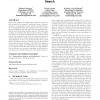Free Online Productivity Tools
i2Speak
i2Symbol
i2OCR
iTex2Img
iWeb2Print
iWeb2Shot
i2Type
iPdf2Split
iPdf2Merge
i2Bopomofo
i2Arabic
i2Style
i2Image
i2PDF
iLatex2Rtf
Sci2ools
105
click to vote
WSDM
2010
ACM
2010
ACM
Beyond DCG: user behavior as a predictor of a successful search
Web search engines are traditionally evaluated in terms of the relevance of web pages to individual queries. However, relevance of web pages does not tell the complete picture, since an individual query may represent only a piece of the user’s information need and users may have different information needs underlying the same queries. We address the problem of predicting user search goal success by modeling user behavior. We show empirically that user behavior alone can give an accurate picture of the success of the user’s web search goals, without considering the relevance of the documents displayed. In fact, our experiments show that models using user behavior are more predictive of goal success than those using document relevance. We build novel sequence models incorporating time distributions for this task and our experiments show that the sequence and time distribution models are more accurate than static models based on user behavior, or predictions based on document releva...
| Added | 18 May 2010 |
| Updated | 18 May 2010 |
| Type | Conference |
| Year | 2010 |
| Where | WSDM |
| Authors | Ahmed Hassan, Rosie Jones, Kristina Lisa Klinkner |
Comments (0)

